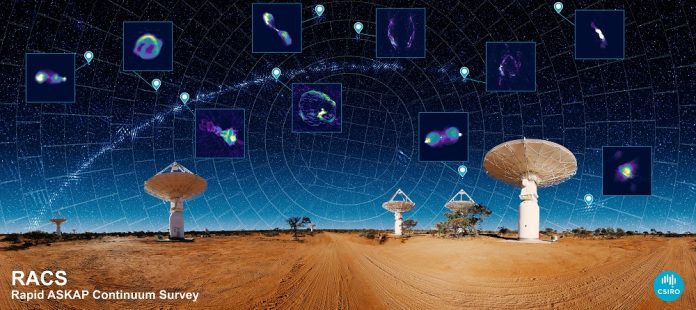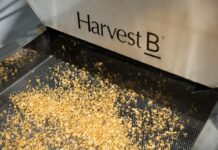
A world-leading CSIRO radio telescope has created a new atlas of the Universe, having conducted its first survey of the entire southern sky in record speed and detail.
The Australian Square Kilometre Array Pathfinder (ASKAP) mapped approximately three million galaxies in just 300 hours, generating 13.5 exabytes of raw data that were processed using software specially created for ASKAP by CSIRO and Pawsey’s Galaxy supercomputer.
CSIRO Chief Executive Dr Larry Marshall said the Rapid ASKAP Continuum Survey was like ‘a Google map of the Universe’ where most of the millions of star-like points on the map are distant galaxies – about a million of which we’ve never seen before.
“ASKAP is applying the very latest in science and technology to age-old questions about the mysteries of the Universe and equipping astronomers around the world with new breakthroughs to solve their challenges,” Dr Marshall said.
“It’s all enabled by innovative receivers developed by CSIRO that feature phased array feed technology, which see ASKAP generate more raw data at a faster rate than Australia’s entire internet traffic.
“In a time when we have access to more data than ever before, ASKAP and the supercomputers that support it are delivering unparalleled insights and wielding the tools that will underpin our data-driven future to make life better for everybody.
The survey team observed 83% of the entire sky using ASKAP at CSIRO’s Murchison Radio-astronomy Observatory (MRO) in outback Western Australia. The Pawsey Supercomputing Centre’s ‘Galaxy’ supercomputer, which is an integral part of the ASKAP observatory, converted the data into 2D radio images containing a total of 70 billion pixels.
Pawsey Executive Director Mark Stickells said the supercomputing capability was ‘a key part of ASKAP’s design’.
“The Pawsey Supercomputing Centre has worked closely with CSIRO and the ASKAP team since our inception and we are proud to provide essential infrastructure that is supporting science delivering great impact,” Mr Stickells added.
Minister for Industry, Science and Technology, Karen Andrews said the record-breaking result proved that an all-sky survey could be done in weeks rather than years, opening new opportunities for discovery.
She said ASKAP’s advanced technologies are providing insights for the development of the Square Kilometre Array (SKA), an international mega-science project to build the world’s largest radio telescopes.
“ASKAP is a major technological development that puts our scientists, engineers and industry in the driver’s seat to lead deep space discovery for the next generation,” Minister Andrews continued.
“This new survey proves that we are ready to make a giant leap forward in the field of radio astronomy.”
Lead author and CSIRO astronomer Dr David McConnell said the new data would enable astronomers to undertake statistical analyses of large populations of galaxies, in the same way social researchers use information from a national census.
“This census of the Universe will be used by astronomers around the world to explore the unknown and study everything from star formation to how galaxies and their super-massive black holes evolve and interact,” Mr McConnell explained.
“With ASKAP’s advanced receivers the RACS team only needed to combine 903 images to form the full map of the sky, significantly less than the tens of thousands of images needed for earlier all-sky radio surveys conducted by major world telescopes.
“For the first time ASKAP has flexed its full muscles, building a map of the Universe in greater detail than ever before, and at record speed.”



















